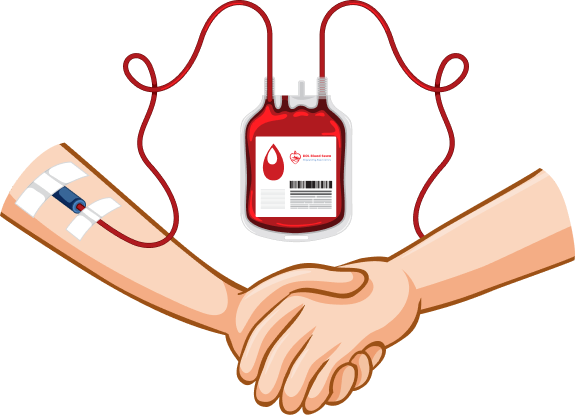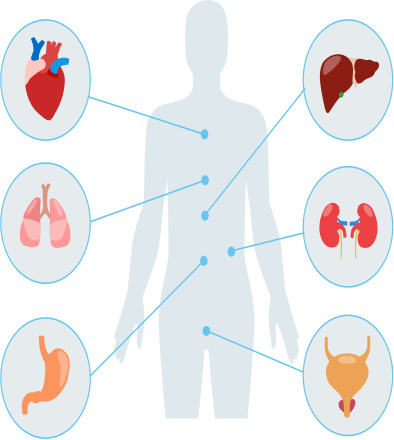BENEFITS OF DONATING BLOOD
Blood donation not only saves the lives of people in need but also offers many health benefits to the donors. There’s no end to the benefits of blood donation for those who need it. It helps in saving the lives of the people. But donating blood doesn’t just benefit recipients it offers various benefits for the donors too. Here is the list of physical, mental, and emotional benefits of donating blood for the donors:

Mental Benefits
Blood donation helps in improving the physical health of donors in various ways and also helps in boosting their immunity. There is a list of physical benefits that blood donation offers which are as follows::

Financial Benefits
Blood donation helps in improving the physical health of donors in various ways and also helps in boosting their immunity. There is a list of physical benefits that blood donation offers which are as follows::

Blood donation helps in minimizing the risk of cancer by maintaining a healthy iron level in the body. Research has investigated that regular blood donation affects cancer risk. It has been hypothesized that by reducing iron levels, blood donation might create an environment less conducive to the growth of cancer cells. In a study published in Cancer Epidemiology, Biomarkers & Prevention (2018), researchers analyzed data from a large cohort of blood donors. They found a significant association between regular blood donation and a reduced risk of certain types of cancer, including liver cancer and colorectal cancer. A study in the Journal of the National Cancer Institute (2017) explored the relationship between iron levels and cancer risk. The researchers found that elevated iron levels were associated with an increased risk of several types of cancer, supporting the idea that reducing iron through blood donation may reduce cancer risk. These studies suggest that there may be a link between regular blood donation, reduced iron levels, and a lower risk of cancers.

Donating blood helps in reducing iron levels in the body which can be replenished after having an iron-rich meal. It takes up to 24 to 30 weeks for the body to replace the iron lost through blood donation. Blood donation helps in reducing diseases which are caused due to high iron levels in the body as excess iron gets stored in organs such as liver, heart and pancreas. Each time you donate blood, you lose between 220-250 mg of iron. Haemochromatosis is a health condition that arises due to excess absorption of iron by the body. Regular blood donation helps in reducing iron overload in the body and maintaining a healthy level of iron.

Heart attacks have been a prominent problem in India and nearly 17 lakh people die every year due to heart diseases. According to the Indian Heart Association, 50% of all heart attacks in Indians occur under 50 years of age. Regular blood donation helps in reducing the risks of arterial blockages and healthy flow of blood and there are fewer chances of getting a heart attack.

Regular blood donation helps in burning calories of donors which is helpful in reducing weight. A person can lose up to 650 calories per pint of blood donated.

Obese people may face a higher risk of developing cardiovascular diseases and other health disorders which can be minimized by blood donation. 2013 study found that regular blood donation lowers total cholesterol, while another found that people who donated blood every six months also had fewer heart attacks and strokes. And these aren’t small reductions in risk. The American Journal of Epidemiology found that blood donors are 88% less likely to suffer a heart attack. https://www.ncbi.nlm.nih.gov/pmc/articles/PMC3663474/

After blood donation, the body works to stimulate new cell production which helps in maintaining good health.ries per pint of blood donated.
https://www.hindustantimes.com/lifestyle/health/world-blood-donor-day-2024-5-reasons-to-donate-blood-health-benefits-to-know-101718347026942.html
Before donation, the donor has to go through a health checkup that includes blood pressure, hemoglobin level check, pulse, and body temperature.

Donated blood is tested for various diseases like HIV, Hepatitis B, Hepatitis C, and the donor is informed about their medical conditions.

Before blood donation hemoglobin level is checked and the donor can check if they maintain a normal hemoglobin level.

Blood donation helps in keeping the liver and heart healthy by minimizing iron overload in the body as excess iron gets stored in the heart and lungs which causes various health problems.
- Boosts Immunity: Good immunity is highly necessary to prevent several ongoing infections. A regular practice of blood donation can also rejuvenate the donor's entire system. Rejuvenation of the blood plasma helps in increasing the leucocyte count as well, the cells that improve immunity and shields from various infections. A study in the journal Transfusion (2019) discussed the role of blood donation in modulating the immune response and how this may contribute to reducing the risk of infections. Also a study in the Journal of Immunology (2017) examined the impact of blood donation on immune cell function. The researchers found that blood donation led to enhanced immune cell activity and increased production of immune factors, suggesting a potential boost to immune system function.
- Could live longer: Doing good for others is one way to live a longer life. A study in Health Psychology (American Psychological association) found that people who volunteered for selfless reasons had a significantly reduced risk of mortality four years later than those who volunteered solely for their own self-interest.
- Reducing risk of metabolic disorders : Researches show that iron reduction through blood donation helps in diabetes and obesity. Some studies suggest that blood donation helps in improving metabolic disorders such as improving insulin sensitivity and reducing the risk of metabolic disorders. Research published in the Journal of Nutrition and Metabolism (2018) discussed the potential role of iron reduction through blood donation in improving insulin sensitivity and reducing the risk of metabolic disorders. A study in Diabetes Care (2017) investigated the relationship between blood donation and diabetes risk. The researchers found that frequent blood donors had a lower risk of developing type 2 diabetes compared to non-donors. This suggests that blood donation may have a beneficial effect on glucose metabolism.

Regular blood donation may lead to a decrease in oxidative stress, which is implicated in various diseases, including cancer and neurodegenerative conditions. A study in Free Radical Biology and Medicine (2018) investigated the impact of blood donation on oxidative stress markers. The researchers found that frequent blood donors had lower levels of oxidative stress compared to non-donors, indicating a potential protective effect against diseases associated with oxidative damage. A study by Högman et al. (2014) investigated the impact of blood donation on oxidative stress markers and suggested that regular donation may reduce oxidative stress and associated disease risks.

Evidence suggests that regular blood donation may lead to lower levels of inflammatory markers, potentially reducing the risk of chronic inflammatory diseases. A study published in the journal Inflammation Research (2018) investigated the impact of blood donation on inflammation. The researchers observed a significant reduction in inflammatory markers among regular blood donors, indicating a potential anti-inflammatory effect. A study by Zalba-Moreno et al. (2016) found that frequent blood donation was associated with reduced levels of inflammatory markers, indicating potential benefits for inflammatory disease prevention.

Donating blood helps in minimizing negative thoughts and feelings as the donor feels enthusiastic and positive after getting to know that their blood saved someone’s life.

Blood donation helps in reducing the stress level of the donor as after donation, the donated blood is replenished by the body which helps the body to stay healthy and also helps in working more efficiently and productively.

It gives a happiness level to the donor for helping someone in need.

Boosts and energizes people when they know that their blood saved someone’s life.

Blood donation helps in providing a sense of belongingness among people.

It reduces the gap between the individuals by bringing them together and connecting them.

It reduces the feelings of social isolation in the society.

Blood donation helps in making a happy environment in the society where the feeling of helping each other brings everyone together.

It helps the donor to help to complete one of the social responsibilities by donating blood.

When a donor rolls up their sleeve and sits down or lays down in that chair/stretcher, they know that they are making a difference—and that makes the donor feel good!

Blood donors often receive complimentary health screenings, including blood pressure, hemoglobin levels, and infectious disease screenings (like HIV, Hepatitis B, and C). These tests can help detect health issues early without any cost, offering substantial savings on routine medical checkups.

Companies encourage employees to donate blood by offering paid leave for donation days. This is a financial advantage, as employees receive their regular pay while contributing to a life-saving cause.

Blood donation centers perform various tests on the donated blood. If any abnormalities or health risks are detected, donors are notified, allowing for early disease detection and potential savings on future healthcare costs.

Some insurance companies offer reduced premiums or special discounts to regular blood donors. By showing a commitment to maintaining good health and contributing to society, donors may be eligible for lower health or life insurance premiums.

Blood donation often provide donors with gift cards, vouchers, which can be used for groceries, entertainment, or other purchases. Though not directly monetary, these rewards can be a bonus.


Social & Emotional Benefits
Blood donation helps in improving the physical health of donors in various ways and also helps in boosting their immunity. There is a list of physical benefits that blood donation offers which are as follows::